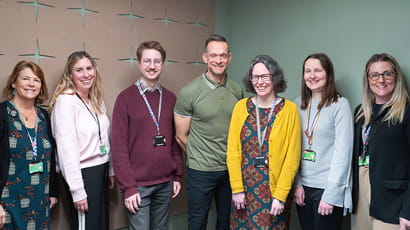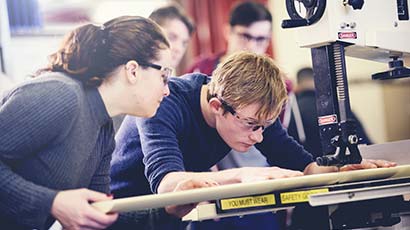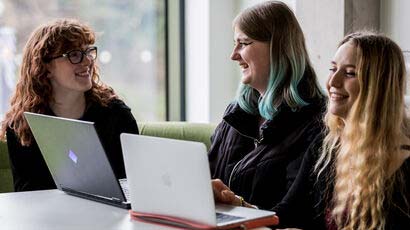Resources for teachers and advisers
Find a range of useful resources to help you support, guide and signpost your students.
University and degree course research
- UCAS - Comprehensive undergraduate course listings, application advice and subject guides.
- Discover Uni - Key data on each degree course, including graduate destinations and salary and student satisfaction.
- Prospects - Job profiles, career options with a degree subject and a career matching tool.
- Careerpilot - Comprehensive information on post-18 options and job profiles, with a South West focus.
- SACU - Generates degree course and apprenticeship ideas based on interests and preferences.
- UniTasterDays – Wide range of university-based events and opportunities for schools and colleges.
Paying for university
Tuition fees and the cost of living away from home is a big investment. It’s important that your students have all the facts and know what it will cost.
- Scholarships and bursaries - UWE Bristol offers a range of scholarships and bursaries to new students and applicants.
- Student Finance England's video guides - Provide information on eligibility for student funding and how to make an application.
- Blackbullion - A free collection of useful online tools and guides to help you understand and prepare for the financial realities of university study.
- Budget friendly student activities - Watch former UWE Bristol student Amberina share her top tips for life in Bristol on a student budget.
Writing your personal statement
Crafting a compelling personal statement is crucial for a successful UCAS application.
For helpful tips and guidance, check out these resources from UCAS and TheUniGuide .
Healthcare personal statements
If you’re interested in a career in healthcare take a look at our guides:
Creative digital portfolios
Watch current creative degree students at UWE Bristol share their top tips for putting together your own digital portfolio.
Take a look at our course information for specific programme details and the latest portfolio requirements.
Get email updates
Sign up to our schools and colleges newsletter to hear about outreach events, activities and opportunities for your students and staff.
Sign up for updatesFuture Quest
Future Quest is a programme designed for students in Years 7 to 13, providing essential information about higher education and your future options.
The Future Quest team offers all schools and colleges free access to their collection of interactive online resources. They also run Future Quest healthcare, a website for students interested in healthcare careers.
Studying at UWE Bristol
Discover our wide range of courses, explore our campuses and facilities, and learn about the support services we offer.
- Applying to UWE Bristol - If you're thinking about applying to UWE Bristol, you'll find all the information you need here—from how to apply for your chosen course to what happens at each step of the UCAS process.
- Personalised virtual tour - We no longer produce a printed prospectus, but we offer a fully interactive virtual tour where you can explore our courses, facilities and discover student life in a way that's personalised to you.
- Life at UWE Bristol - Learn about our city, campus and facilities. Explore the sports, activities and societies we offer, and discover ways to get involved in volunteering, music and other interests.
- Accommodation at UWE Bristol - We want you to feel at home from the moment you arrive. Take a 360 degree tour of our living spaces and get useful advice from our accommodation experts.
Preparing for higher education study
Boost your confidence and develop essential skills for university success by exploring our online workbooks.
- Getting ready to study at UWE Bristol - In this tutorial we cover how you will be taught, assessed and learn at UWE Bristol. We’ll consider what’s expected when studying at university level, and the study skills you need to get the most from your time with us.
- How to make notes and read effectively - This workbook aims to enhance your academic reading and note-taking skills. You'll learn to evaluate reading materials, use skimming and scanning tactics, prepare for lectures, and build on your notes.
- How to reference and avoid plagiarism - This workbook teaches you all about citing and referencing rules, so you’ll be able to correctly acknowledge sources and avoid any plagiarism in your assignments. It also shows you how to apply the best fit approach to different types of information and how to paraphrase effectively.
- How to plan and structure your writing - This workbook shows you how to plan and structure your writing. We’ll focus on techniques such as analysing assignment titles, organising your thoughts clearly and using paragraphs correctly.
- How to put your reading into writing - This workbook introduces you to the concept of synthesis and why it’s important, as well as how to effectively summarise research and identify themes within reading.
- How to write critically - In this workbook you’ll be encouraged to question your assumptions about information and evaluate evidence, helping you to develop the key skill of critical thinking.
Outreach activities and resources

Activities at your school or college
Interactive workshops and talks on post-18 pathways, higher education and university life, led by UWE Bristol.

Campus visits and taster days
Discover opportunities for your students to visit our campuses and explore higher education and university life.

Meet the Widening Access team
Our goal is to break down barriers to higher education, especially for under-represented groups, by providing the skills, knowledge, and confidence needed for success.
You may also be interested in

Undergraduate Open Days
Find out what’s waiting for you at an undergraduate Open Day.

Ask a student
Ask a current student questions about their course, what it's like to study with us, or life in Bristol.

Campus and facilities
We've invested £300 million into our modern facilities, creating the most effective and empowering setting for our students and people to discover their potential.

Contextual offers
About contextual offers at UWE Bristol — what they are, who's eligible, and the support you'll receive.
